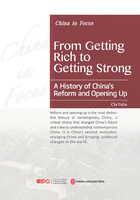
Preface
Reform and opening up defines contemporary China. It is a critical choice that decides the future of the country. In his keynote speech at the Boao Forum for Asia annual conference in 2018,Chinese President Xi Jinping pointed out: In 1978, proposed by Deng Xiaoping and marked by the Third Plenary Session of the 11th CPC Central Committee, China initiated its historical course of reform and opening up. From the countryside to cities, from trial runs to wide implementation, from economic reform to overall reform, we have written a glorious chapter of our nation and people during these 40 years, striving with one heart and forging ahead despite difficulties.
The opening-up drive has profoundly changed China. Over a course of 40 years China has successfully held onto the historical opportunities brought about by globalization, upholding the basic national policy of opening up. It has achieved a great transition from a closed economy to overall openness, contributing to global growth tremendously.
A summary of China's experience shows that it has significantly boosted its markets and economy through reform. In 1978-2018 China's GDP grew by 35.7 folds, registering an annual average of 9.4%,far higher than the growth rates of other major economies during the same period. The share of its GDP in the global economy grew from 1.8% to 15%, making it the second fastest growing economy.
China's opening-up drive has had a profound impact on the world.Beginning from special economic zones, China has expanded a multilayer network of open cities from the coast to the inland. At the turn of the 21st century, China became a member of the WTO, docking its domestic economy with world trade rules. Since the 18th CPC National Congress in 2012, China has proposed the Belt and Road Initiative;the establishment of pilot free trade zones and ports, as part of the effort to bulid an open economy; and participation in global economic governance through the World Economic Forum, G20 Summit, and the Shanghai Cooperation Organization. China is moving faster to change its role from a participant and follower to a promotor and facilitator of globalization. Since President Xi Jinping made the proposal of building a community of shared future for humanity in 2013, it has been warmly welcomed and recognized by more and more countries and people. As a major country, China is contributing Chinese wisdom and solutions to promoting world peace and development for a brighter future of mankind. It can be said that reform and opening up has not only changed China, but also influenced the world.
Reform and opening up is a key to understanding contemporary China. It has only taken China a few decades to become the world's biggest manufacturer, biggest trader in goods, second most-invested country, third largest investor, and largest investor among developing countries. Why do we say that reform and opening up is key to deciding the future of contemporary China? How has China fared the 40 years of reform and opening up? What has it done and what is its experience?Looking back the past four decades, this book tells the stories of China's reform and opening up in chronological order, to help readers around the world understand the great initiative.
A summary of the past experience helps to better carry on the drive. At the gathering commemorating the 40th anniversary of reform and opening up, President Xi Jinping pointed out: The valuable experience accumulated during the 40 years of reform and opening up is a spiritual wealth of the Party and the people, as it guides our practice in upholding and developing Chinese socialism in the new era.We must cherish it and continue to enrich and develop it in practice.
Right now we are standing at a new historical juncture of reform.It is not easier than 40 years ago considering the complexity, sensitivity and difficulty of the tasks. To carry on reform to the end, we must be bold and decisive in making breakthroughs, to ensure sustainable development in the long run.
At the Third Plenary Session of the 11th CPC Central Committee in December 1978, the Party set the guideline to "emancipate the mind and seek truth from facts", and decided to shift the focus of the Party and the nation to economic development and initiate reform and opening up. The Resolution on Certain Questions in the History of Our Party Since the Founding of the People's Republic of China, adopted at the Sixth Plenary Session of the 11th CPC Central Committee, concluded that the Cultural Revolution was wrong, thus bringing order out of chaos.